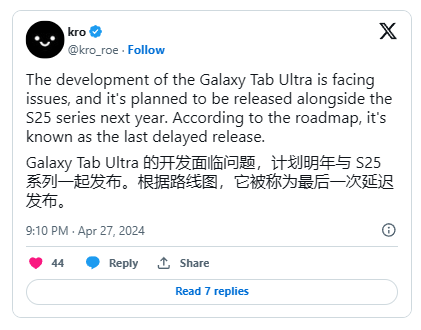Igeekphone news on April 29, Samsung did not follow the established release cycle of the Galaxy Tab S8 Ultra and Galaxy Tab S9 Ultra, so the release time of the next-generation flagship tablet Galaxy Tab S10 Ultra is not clear. The latest rumor claims that Samsung has encountered some problems in the development of its high-end tablet, which is reported to be unveiled alongside Samsung’s Galaxy S25 series flagship smartphones, which will be released in early 2025.

However, it is unknown whether the lower-priced Galaxy Tab S10 and Galaxy Tab S10 Plus will be released alongside the Galaxy Tab S10 Ultra. According to sources “kro”, Samsung’s largest and most expensive tablet will be released alongside the Galaxy S25 series next year. IT House noted that the last time Samsung launched a flagship smartphone and tablet product line at the same time was back in 2022, when it released the Galaxy S22 and Galaxy Tab S8 Ultra series. Samsung may be considering a similar launch strategy, but the rumor doesn’t reveal details about the Galaxy Tab S10 Ultra development issues.
Since Qualcomm has officially released the Snapdragon X Elite and Snapdragon X Plus, coupled with the Snapdragon 8 Gen 4, which is expected to be released in October, Samsung may be facing another conundrum. In addition, the Samsung Galaxy S25 series is said to adopt a dual-chipset strategy, and some models will be equipped with an Exynos 2500 processor. It was previously rumored that the Exynos 2500 would launch in two versions, one with an eight-core CPU cluster and the other with a ten-core CPU cluster.

The higher-core version is likely to be tailored for larger devices such as tablets, and the Galaxy Tab S10 Ultra is expected to have a similarly massive 14.6-inch display, taking into account previous Galaxy Tab Ultra models. With this size and cooling capability, the Galaxy Tab S10 Ultra can be powered by Snapdragon X Elite, Snapdragon X Plus, Snapdragon 8 Gen 4, and Exynos 2500 processors. However, Samsung seems to be in a dilemma when it comes to choosing a processor.
On the one hand, if the Exynos 2500 processor is adopted, Samsung can save component costs and avoid paying Qualcomm’s premium. However, it also means that the Galaxy Tab S10 Ultra may lag behind Apple’s next-generation iPad Pro line, which is rumored to feature M3 chips, in terms of performance. On the other hand, if Qualcomm’s chipset is used, Samsung will not only need to pay an additional fee, but also do not make financial sense considering that Samsung does not have a high share of the global tablet market.









